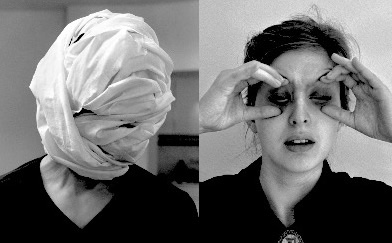Cahiers du Cinéma has asked you for an interview, because you’re a “Philosopher” and we wanted to do something philosophical, but more specifically because you like and admire Godard’s work. What do you think of his recent TV programs? Like many people, I was moved, and it’s a lasting emotion. Maybe I should explain my image of Godard. As someone who works a great deal, he must be a very solitary figure. But it’s not just any solitude, it’s an extraordinarily animated solitude. Full, not of dreams, fantasies, and projects, but of acts, things, people even. A multiple, creative solitude….
Tag: Gilles Deleuze
dreaming of one thing [subversive chronicle]
i said endurance has its limits people are made of flesh and bone / i spoke about the stalinists and the method of executing the very best as traitors / who died screaming long live the party! / sifis said / the statement is only the beginning. then they will ask who are your friends. / then where do they live. katerina gogou i believe at heart that one must not be an accomplice to lies and compromise, the contemporary artist must scream out their revolt and make understood that we live in an unbearable, cruel, and…
Nathalie Wourm | Poetic Sabotage and the Control Society: Christophe Hanna, Nathalie Quintane, Jean-Marie Gleize
Parallels can be drawn between Gilles Deleuze and Félix Guattari’s concept of “minor literature” and the artistic practice of a number of contemporary French writers, whose works do not only represent the voicing of their political contentions, but also act as verbal objects designed to undermine the mainstream idea of what literature is and should be. [..] Christophe Hanna, Nathalie Quintane, and Jean-Marie Gleize are three authors who share a number of theoretical ideas and political references and have been expressing their opposition to the system in this way.
Félix Guattari | Militant Incidences
1 On the Question of “Primordial Bureaucratic States”1 Since you have asked me to elaborate on my thoughts about stylites and other dendrites, I will take a stab at laying out some of the connections here. Mystics—Coptics, Syrians and other, express their desire to return to the roots, the roots of the primordial Empire: the Ur-State (there is a wordplay like this in the book by Lacarrière).2 In their own way, they’re championing the Asiatic State. The Egyptians and the sons of Trojan warriors never could take being fucked with and eliminated by barbarians and pirates like the Greeks,…
The Power of Political, Militant, ‘Leftist’ Cinema. Interview with Jacques Rancière
By Javier Bassa Vila Jacques Rancière’s thought is undisciplined, at least in two different but interlinked senses. On the one hand, in the 1970s Rancière suggested a reading of Marxism that broke with the dominant interpretations of the time, specially with the scientifist Marxism imposed by Althusser (see La leçon d’Althusser, originally published in 1976 and re-published in 2012 by La Fabrique – and due to come out soon in Spanish). On the other hand, the broad interest that his thought has triggered at an international level seems to be also the consequence of another in-discipline: his reflections are…
Félix Guattari | Schizoanalytic Cartographies
Schizoanalytic Cartographies represents Félix Guattari’s most important later work and most systematic and detailed account of his theoretical position and his therapeutic ideas. // Andrew Goffey identifies the text as being “perhaps one of the last big books of French ‘theory’ – that extraordinary efflorescence of thinking that occurred in the wake of the events of 1968 …
Fernand Deligny | The Arachnean and Other Texts
The originality of Deligny’s theoretical and practical position consists precisely in what can be called a “suspension of interpellation,” in which one can also see a fundamental point of intersection with the inaugural gesture of psychoanalysis, over and beyond the explicit oppositions, as will become clear. One might say that to “the theoretical anti-humanism” professed by Althusser, Deligny opposed an authentic “practical anti-humanism” that dismissed “men,” the humans-that-we-are, shored up by what Deleuze called a “thought image” of themselves, a flattering, ready-made image, dominating and exclusive, in favor of a narcissistically and socially less satisfying “human,” possibly mute and idle, but in reality more richly endowed with practical recompositions.
Pragmatic/Machinic: Discussion with Félix Guattari [by Charles J. Stivale]
The following discussion with Félix Guattari took place in his apartment in Paris. With the help of a number of friends, I had prepared a set of questions, and had contacted him to see if he might be available to answer some of them.\1 He responded immediately, and left messages with the friend in Paris in whose apartment I would be staying. Prior to the trip, I also had contacted Gilles Deleuze to arrange an extended interview, and although his schedule and health prevented him from agreeing to a long session, I did visit him at his apartment the…
Gilles Deleuze | Postscript on the Societies of Control
1. Historical Foucault located the disciplinary societies in the eighteenth and nineteenth centuries; they reach their height at the outset of the twentieth. They initiate the organization of vast spaces of enclosure. The individual never ceases passing from one closed environment to another, each having its own laws: first, the family; then the school (“you are no longer in your family”); then the barracks (“you are no longer at school”); then the factory; from time to time the hospital; possibly the prison, the pre-eminent instance of the enclosed environment. It’s the prison that serves as the analogical model: at the…
Gilles Deleuze | Control and Becoming
Negri: The problem of politics seems to have always been present in your intellectual life. Your involvement in various movements (prisoners, homosexuals, Italian autonomists, Palestinians), on the one hand, and the constant problematizing of institutions, on the other, follow on from one another and interact with one another in your work, from the book on Hume through to the one on Foucault. What are the roots of this sustained concern with the question of politics, and how has it remained so persistent within your developing work? Why is the relation between movement and institution always problematic? Deleuze: What I’ve been interested in…
Deleuze, Marx and Politics ((The Grandeur of Marx)) | by Nicholas Thoburn
→ Full book: PDF NICHOLAS THOBURN DELEUZE, MARX AND POLITICS FIRST PUBLISHED 2003 BY ROUTLEDGE Introduction: The grandeur of Marx For the race summoned forth by art or philosophy is not the one that claims to be pure but rather an oppressed, bastard, lower, anarchical, nomadic, and irremediably minor race. Deleuze/Guattari; What is Philosophy? one does not belong to communism, and communism does not let itself be designated by what it names. Maurice Blanchot; Friendship Gilles Deleuze’s comment that his last book, uncompleted before his death, was to be called The Grandeur of Marx leaves a fitting…
Félix Guattari; The Anti-Œdipus Papers
Félix Guattari; The Anti-Œdipus Papers Full book Notes and journal entries document Guattari and Deleuze’s collaboration on their 1972 book Anti-Œdipus. “The unconscious is not a theatre, but a factory,“ wrote Gilles Deleuze and Félix Guattari in Anti-Œdipus (1972), instigating one of the most daring intellectual adventures of the las half-century. Together, the well-known philosopher and the activist-psychiatrist were updating both psychoanalysis and Marxism in light of a more radical and “constructivist“ vision of capitalism:“Capitalism is the exterior limit of all societies because it has no exterior limit itself. It works well as long as it keeps breaking down.“ Few…
Gilles Deleuze & Félix Guattari | May ’68 Did Not Take Place
In historical phenomena such as the revolution of 1789, the Commune, the revolution of 1917, there is always one part of the event that is irreducible to any social determinism, or to causal chains. Historians are not very fond of this point: they restore causality after the fact. Yet the event itself is a splitting off from, a breaking with causality; it is a bifurcation, a lawless deviation, an unstable condition that opens up a new field of the possible. In physics, Ilya Prigogine spoke of states in which the slightest differences persist rather than cancel themselves out, and…
Deleuze/Guattari; How Do You Make Yourself a Body Without Organs?
At any rate, you have one (or several). It’s not so much that it preexists or comes ready-made, although in certain respects it is preexistent. At any Tate, you make one, you can’t desire without making one. And it awaits you; it is an inevitable exercise or experimentation, already accomplished the moment you undertake it, unaccomplished as long as you don’t. This is not assuring, because you can botch it. Or it can be terrifying, and lead you to your death. It is nondesire as well as desire. It is not at all a notion or a concept but…
Deleuze & Guattari; Capitalism: A Very Special Delirium
Actuel: When you describe capitalism, you say: “There isn’t the slightest operation, the slightest industrial or financial mechanism that does not reveal the dementia of the capitalist machine and the pathological character of its rationality (not at all a false rationality, but a true rationality of this pathology, of this madness, for the machine does work, be sure of it). There is no danger of this machine going mad, it has been mad from the beginning, and that’s where its rationality comes from.“ Does this mean that after this ‘abnormal’ society, or outside of it, there can be…















